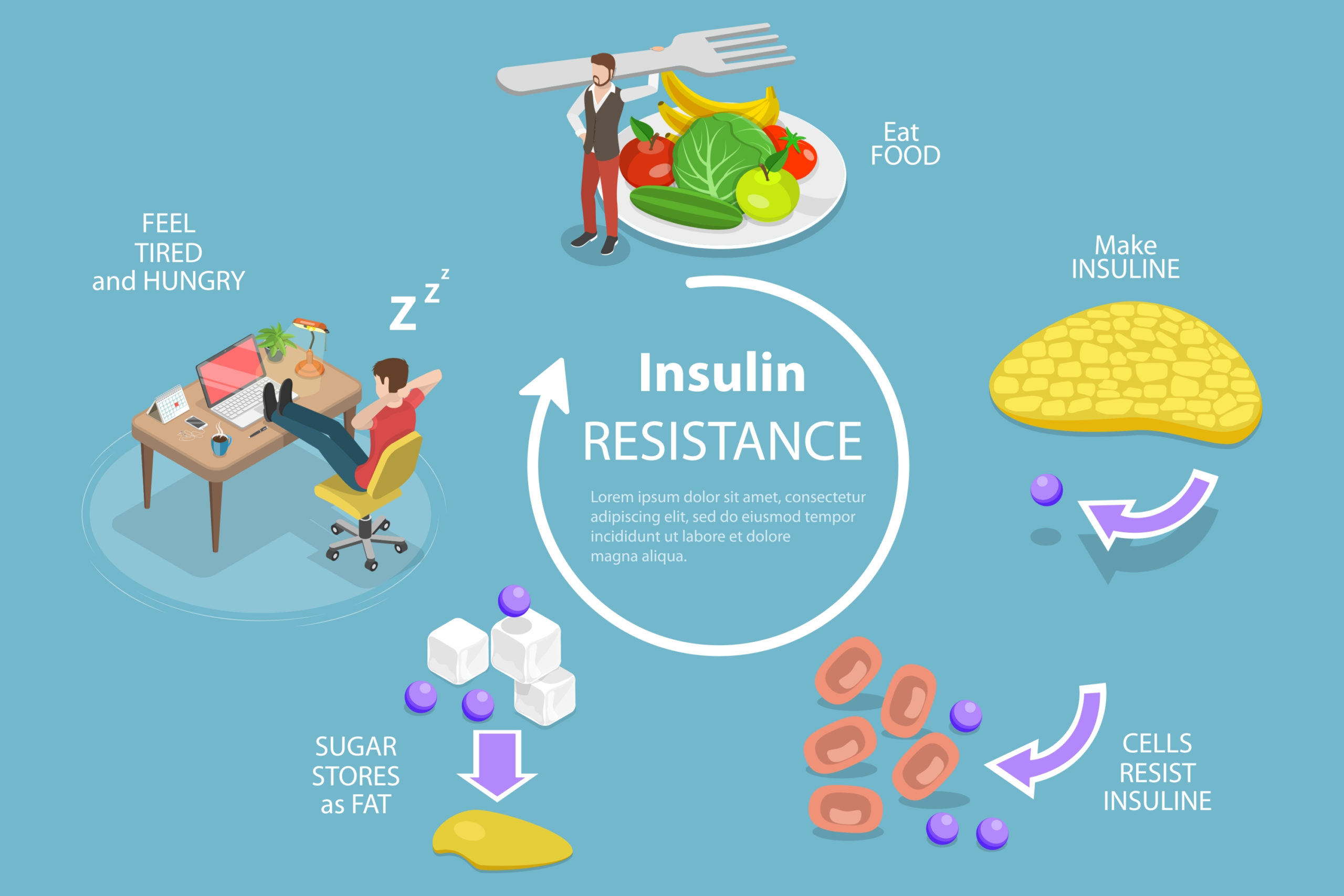
Insulin resistance and weight gain
Insulin Resistance And Weight Gain
Insulin resistance occurs when the body fails to respond appropriately to insulin. Insulin is a hormone that helps sugar move from your blood into your cells, where it is used for energy. When your body becomes resistant to insulin, it needs to make more of it to do the same job. Over time, this can lead to high blood sugar and weight gain.
Many people who are trying to lose weight find it very hard, even when they eat less and exercise more. This can be because of insulin resistance. When insulin is not functioning correctly, your body stores more fat, particularly around your abdomen, and you may experience increased hunger.
In this blog, you will learn how insulin resistance works, how it causes weight gain, and what you can do to fix it. We will also examine common signs and symptoms, healthy eating tips, the importance of exercise, and when to consult a doctor. Everything will be explained straightforwardly, using real facts from trusted health websites and scientific studies.
You do not need to be a doctor or scientist to understand this blog. If you want to learn how to take better care of your body and feel better, keep reading.
What is Insulin Resistance?
Insulin is a hormone made by your body. It helps move sugar from your blood into your cells. Your cells use this sugar as an energy source.
When you eat foods like bread, rice, or sweets, your body breaks them down into sugar. This sugar goes into your blood. Insulin helps remove sugar from your blood and transports it into your cells. This keeps your blood sugar level normal.
Sometimes, the cells in your body stop listening to insulin. This is called insulin resistance. It means your body needs to produce more insulin to perform the same function. Over time, your blood can have too much sugar and too much insulin.
When this happens, your body begins to store more fat, particularly around your abdomen. It also makes it harder to lose weight. Even if you are trying to eat less and move more, insulin resistance can make weight loss difficult.
Insulin resistance can be caused by eating too much sugar and junk food, not moving enough, gaining too much weight, or even from family history. Not getting enough sleep or feeling stressed all the time can also exacerbate the condition.
If it is not treated, insulin resistance can lead to serious problems like type 2 diabetes or heart disease. The good news is that with better food choices, increased physical activity, and healthy habits, you can help your body function more optimally again.
You can learn more from trusted health websites, such as the NIDDK.
Why Insulin Resistance Leads to Weight Gain
Insulin resistance can make you gain weight more easily. It can also make it harder to lose weight. This happens because insulin tells your body to store fat.
When you eat food, your body turns it into sugar. This sugar goes into your blood. Insulin helps move sugar into your cells, where it can be used for energy.
However, when you have insulin resistance, your cells do not adequately take in sugar. The sugar stays in your blood. Your body then makes more insulin to try to help. Too much insulin tells your body to change the sugar into fat. This fat is often stored around your stomach.
Additionally, when your body cannot utilise the sugar for energy, you may feel tired or hungry even after eating. This can make you want to eat more, especially foods like sweets and snacks. This leads to increased sugar, insulin, and fat.
The more fat your body stores, the worse the insulin resistance becomes. And the worse the insulin resistance gets, the more fat your body stores. It becomes a cycle that can be difficult to break.
You can read more from the Obesity Medicine Association.
Signs and Symptoms of Insulin Resistance
Insulin resistance can be challenging to detect initially. Many people have it and are unaware. However, some signs may indicate something is not right.
One sign is feeling tired a lot. Even if you sleep well, you might still feel low on energy. This happens because your body cannot effectively use the sugar in your blood for energy.
Another sign is feeling hungry soon after eating. Your body is not getting enough energy, so your brain tells you to eat more. You may also crave sweet foods, such as bread and chips.
Gaining weight is also a common sign. The extra weight often builds up around your tummy. This type of fat can indicate that your insulin is not functioning correctly.
Some people get dark, thick patches on their skin. These can appear on the back of the neck, under the arms, or behind the knees. These patches serve as a warning that your body may be having trouble with insulin.
Other signs can include feeling sleepy after meals, having trouble thinking clearly or feeling like your mind is cloudy.
If insulin resistance worsens, it can lead to high blood pressure, elevated blood sugar levels, or high cholesterol levels. These can cause serious problems like heart disease or type 2 diabetes.
If you notice any of these signs, it is advisable to consult a doctor. They can check your blood and help you find out what is going on.
How Weight Gain Makes Insulin Resistance Worse
Insulin resistance can cause weight gain. However, weight gain can also exacerbate insulin resistance. This can become a problem that perpetuates itself in a cycle.
When you gain too much fat, especially around your tummy, your body starts to work differently. This fat can cause something called inflammation. Inflammation occurs when your body becomes swollen or stressed internally. Even if you don't feel it, it can prevent insulin from working correctly.
As you gain more fat, your cells stop listening to insulin. Your body attempts to compensate by producing more insulin. But too much insulin tells your body to store even more fat. This makes the problem worse.
Extra fat also affects your hormones. Hormones are chemicals in your body that help regulate functions such as hunger, sleep, and stress. When your hormones are not working right, you may feel hungrier, sleep poorly or want to eat more sugar. All of this can make insulin resistance harder to manage.
For example, when you don't get enough sleep or feel stressed, your body produces a hormone called cortisol. Cortisol can increase your blood sugar levels and impair insulin's ability to function correctly.
This is why excessive fat, poor sleep, and stress can all exacerbate insulin resistance. But there is good news. If you eat better, move more and get enough sleep, you can help your body work properly again.
How Does Insulin Resistance Cause Weight Gain?
Our blood sugar levels are regulated by insulin. Besides promoting fat storage, insulin stimulates hunger and can lead to cravings. As we reviewed, the pancreas produces more insulin when insulin resistance occurs. In other words, the body is ready to store fat. Conversely, insulin's effect on hunger can lead to an increase in food consumption. Weight gain and weight loss are impacted by insulin resistance due to these effects.
It's possible! Type 2 diabetes can be prevented by losing weight and improving insulin sensitivity. There is even evidence that weight loss can reverse insulin resistance. Weight loss can be challenging with insulin resistance for the reasons discussed above; however, it is still possible. A few effective strategies are listed below:
- Calorie reduction is essential. Individuals with insulin resistance should reduce their calorie intake to achieve weight loss. This needs to be done sustainably. It is generally unhealthy and ineffective to severely restrict calories or follow fad diets. Registered Dietitians are great resources if you need help reducing your calorie intake in a healthy manner.
- Low-sugar carbohydrates with high fibre content are best. To control blood sugar and insulin levels, it is recommended to consume more complex carbohydrates, such as vegetables and whole grains, rather than simple carbohydrates, including white bread, white pasta, cookies, and chips.
- Don't drink sugary drinks. You may develop insulin resistance over time by drinking beverages high in added sugar, which can cause your blood sugar and insulin levels to spike. Limiting sugar in your drinks is crucial for weight loss and diabetes prevention. As a few strategies to help you reduce the amount of sugar you consume, try flavoured sparkling water instead of soda and decrease the amount of sugar you put in your morning cup of coffee.
- Become more active. Weight loss and blood sugar control are two benefits of physical activity. Start by walking your dog, parking farther away, or taking the stairs, even if you're not physically active.
Consult your doctor about medication. The use of drugs may be a solution for you if you are following healthier habits but still have trouble losing weight or improving blood sugar levels. Weight loss and insulin resistance can both be improved with weight loss medications. You may want to discuss one of these options with your doctor.
Frequently Asked Questions
What is insulin resistance, and how does it affect weight gain?
Insulin resistance occurs when the body's cells fail to respond appropriately to insulin. This causes the body to produce more insulin to regulate blood sugar levels. High insulin levels lead to increased fat storage, particularly around the abdomen, making it easier to gain weight and harder to lose it.
Why is it hard to lose weight with insulin resistance?
When you have insulin resistance and weight gain, your body stores more fat and burns less for energy. You may also feel hungrier because your cells are not getting the energy they need. This can lead to overeating and slow weight loss, even with diet and exercise.
Can insulin resistance be reversed naturally?
Yes, improving insulin resistance naturally is possible with healthy habits. Eating a balanced diet, engaging in regular physical activity, getting sufficient sleep, and managing stress can all help. These changes enhance how insulin functions in the body and may help reduce belly fat over time.
What are the early signs of insulin resistance and weight gain?
Common signs include feeling tired after eating, often feeling hungry, gaining weight around the abdomen, and craving sugar or carbohydrates. Some people may also get dark patches of skin on the neck or under the arms. These signs can happen before blood sugar levels become too high.
Does belly fat indicate insulin resistance?
Belly fat and insulin resistance often go together. Excess fat around the stomach is a sign that your body may not be utilising insulin effectively. This type of fat increases the risk of health problems, such as type 2 diabetes and heart disease, so it is essential to be mindful of it.
What is the best diet for insulin resistance and weight loss?
The best diet for managing insulin resistance and promoting weight loss includes whole foods such as vegetables, fruits, nuts, lean protein, and healthy fats. Try to avoid sugary drinks, white bread and processed snacks. A low-glycaemic diet helps keep blood sugar and insulin levels steady.
Can exercise help reverse insulin resistance and reduce weight?
Yes, regular physical activity can improve insulin sensitivity and aid in weight loss. Walking, biking, or lifting light weights helps muscles use sugar more efficiently. Exercise also helps lower insulin levels and supports fat loss, especially when combined with a healthy diet.
How Weightloss Coach Can Help with Weight Gain and Insulin Resistance
Personalised weight loss plans developed by Weightloss Coach consider biological factors such as insulin resistance. Doctors at our practice specialise in treating obesity and insulin resistance. Give us a try if you're looking for medical weight management care! We can create a personalised path for you to improve your health and lose weight.
Learn if you're a good fit for Weightloss Coach by taking our quiz!


